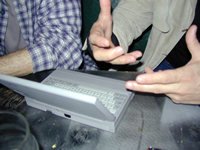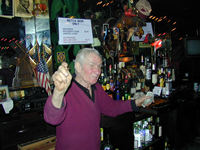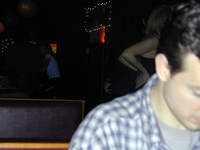| |

 met Joe Tabbi and Nicholas Montfort in a bar in the East Village. They were already peripheral characters in the hypertext. William and Dirk, let’s face it, had slid in the production department. We needed new writers, and we needed them fast. Frank was in California. Now you don’t know if this is true, or if the bar that we were in was the holiday Bar in East Village, in New York City. The bartender who looks like William Gaddis and speaks English haltingly and inconvincingly, in fact drunkenly, had dubbed me the producer. Joe and I had drunk white wine with David Markson, who didn’t drink much anymore, and we were discussing the end of history. met Joe Tabbi and Nicholas Montfort in a bar in the East Village. They were already peripheral characters in the hypertext. William and Dirk, let’s face it, had slid in the production department. We needed new writers, and we needed them fast. Frank was in California. Now you don’t know if this is true, or if the bar that we were in was the holiday Bar in East Village, in New York City. The bartender who looks like William Gaddis and speaks English haltingly and inconvincingly, in fact drunkenly, had dubbed me the producer. Joe and I had drunk white wine with David Markson, who didn’t drink much anymore, and we were discussing the end of history.
It was the first real-time fictionalization that Tabbi had been subjected to, and he wasn’t sure whether a third or first-person narrative was right for the ongoing present. but the bartender, who announced, ‘sinatra’s gone, i’m here!’told us all to go fuck ourselves—and that distracted us from the paradox of real-time narrative.
The blind electric organ player had heard the patter of the keyboard. He clicked the Bassa Nova switch and started hurling insults at us as an enticing rythym pulsed throughout the bar.
A waif appeared in the doorway, looking sad and huge-eyed. Eyeing no peanuts, it absconded with an ashtray, probably hoping to hock it somewhere down the street in exchange for a morsel.
The issue of the digital divide was brought to us in clear distinct terms by a bartender who said “fuck your computer shut off.” He wanted me to play some songs in the jukebox so that he could sing and be the center of our undivided attention. I wondered if this was autopoiesis and if I was spelling it correctly and if in fact the majority of the people that I knew or know are fictional characters including this schmuck behind the bar.
The bartender tried to explain that our writing with a fucking computer at his bar interrupted his life, his conception of what his bar should be. Was this like whipping out a cellphone at an all men’s club with rules from the 19th Century? All the women are wearing skirts and I begin to think that the end of history is near and that it might be a good thing.
And so I begin to love the simple harsh coding of HTML, which even a lumpen ill-trained in grammar can understand.
The photographer and the fashion model experience nothing compared to the grief that a writer feels with a laptop in an oldtime bar.
The bartender challenged us to be producers, and we were producing.
Watch where you hitch your wagon.
It might bite you in the ass.
Rain came down, harder than the drizzle when we arrived. Not a sign of the second round, though we’d ordered it more than ten minutes ago.
Nick noted that he enjoys writing in the third person—it made him feel like Norman Mailer (who felt like Henry Adams when he tried it in Armies of the Night).
A photographer asks Scott to keep his profile to the camera while she takes a shot of the bartender.
The organ player, from the other room, leaves off his Bassa Nova-inspired string of insults and begins kicking out the jams.
The laptop is handed off.
In the darkness, the luminous Apple signals out from the typer like a beacon, summoning comments from the surrounding people at the bar. “What kind of a notebook is that?” “Hey, you’re typing in a bar! Heeeeaah!” “Is that an Apple? I used to have an Apple //.”
The writer perseveres, pausing only to take an occasional swig of tequila. Yes, by now the beer-to-tequila transition has been made. The writer hesitates for a moment, sips, bites the lime, licks the salt off of his wrist, and continues.
Someone comes to the door and knocks, as if it were the door of the Law. No one answers, so the person comes in, as if it were the door of a Bar instead of the door of the Law.
A small form flits by the doorway, quickly. Perhaps it was the dejected waif. Perhaps some reveler.
A single, lugubrious couple—a midget woman and a octogenarian man—begin dancing a sort of waltz.
The writing continues, fervent, earnest, as if the writer were creating the surrounding world. Only a brief break for another sip of tequila.
Meanwhile, Scott and Joe are being macked on earnestly by “chicks.” The one engaging Scott in conversation undulates her youthful—perhaps, despite New York State laws to the contrary, teenage—body provocatively as she coos to him. Joe has a more sizeable and determined suitor, who begins quizzing him about his astrological compatibilty.
“I don’t have a sign, actually,” Joe says. “I wasn’t born, you see.”
Nick types furiously, casually, as if authoring some Borgesian dream of a woman in a fictive lecture hall. In fact, he’s writing a ghastly and nightmarish vision, set in a surreal post office, that won’t make it past the Unknown’s flimsy editorial process—which involves little but squinting and reading through but which is still sturdy enough to prevent such disturbing, grisly scene from seeing the phosphorous light of the screen.
Nick, a notational neophyte, knows that not. He types fervently, sweat forming on his brow, and, in a disgusting and off-putting manner, on his trembling upper lip.
Joe’s cool replies fail to dissuade the woman who is chatting him up.
Nick takes a swig of tequila and keeps punding at the keyboard.
“Turn fucking computer off” says the bartender again, making a circular gesture with his hand, and slapping the back of the laptop, threateningly.
“Crane kick is invulnerable to all attacks!” Nick says, knowing that the bartender’s grasp of English is fragile. He closes the keyboard for a moment, smiles, and waits until the bartender looks away to resume typing.
Scott remarks that Nick gets laid a lot for a kid of his age, that when Scott himself was Nick’s age, he spent like four months reading Beckett’s trilogy and comprehensive criticism of Beckett’s trilogy, and drinking Irish whiskey, interspersed with periodic rounds of marijuana from Kentucky, not getting laid, spending much time thinking of a Catholic girl he once knew, in remembrance of fling past, and that two years before the time Scott was Nick’s age, and meanwhile reading Beckett’s novels which were in fact about what a pain in the ass it was to be a writer when it is now impossible to say anything, really. And still having trouble putting together a sentence, really. Markson would have been thinking about baseball and Anne Beatty. Such is the lot of the serious writer, or was in the twentieth century.
The nubile youngster pursuing Scott has insinuated herself almost into his lap.
The midget and octogenarian were dancing—well, not cheek-to-cheek, exactly, but slowly and close.
Now Nick began typing with renewed energy, as if he had abandoned the Borgesian lecture hall and started to dream an enticing woman from scratch.
The nubile youngster left the room, Scott was thinking about Beckett again. A woman was sitting at a machine which replicated gambling in Las Vegas, poker, but it did not put out… chips… like in Vegas. The woman, perhaps twenty-two, was wearing a halter-top, black, probably some kind of cotton ah synthetic mix. Tabbi pointed her out in order to argue for some kind of Joycean interpretation of events involving simple fate.
“Thank god we don’t have a war to worry about, and that jobs are fucking easy to come by, and that we can be whatever the fuck we want to be right now,” Frank said. A woman in leather pants was undulating at the pinball machine. What would Gaddis have thought of her?

|
 t was amazing to watch Scott putting out text. He had an almost unimaginable intensity about him. Earlier I’d had to take my full-length mirror down off the wall for him to do lines—the smaller mirror I kept on hand for such purposes wasn’t adequate. t was amazing to watch Scott putting out text. He had an almost unimaginable intensity about him. Earlier I’d had to take my full-length mirror down off the wall for him to do lines—the smaller mirror I kept on hand for such purposes wasn’t adequate.
Now, he laid down paragraph after paragraph, directly into an intimidating, steaming tangle of HTML. The “chicks” began to flock around him in admiration, leaving the bartender to wail by himself at the other end of the bar.
—I lubdbvs you guys
—knock knock
—I don’t believe you
—that’s the wrong beer
It was hot and it stank, and all attempts to write like Gaddis on a small keyboard were bound to fail.
The bartender grew irate.
 —why you fuck yourself now?
—why you fuck yourself now?
—it’s our job we’re writers.
—fuck you i don’t go a shit about writers. i’m drunk. you sober? look at that shit: wahhhhhhhhhhahhhhhhhhahhhhhhhahhhh.
—that was a long note.
Scott ordered another round, to distract the bartender from the ‘production’—but the writing was attracting attention around the bar, and taking attention away from the bartender’s own variations on Sinatra.
The round, it seemed, was not going to materialize. The bartender was somewhat placated by a photographer who appeared and called him “sweetie,” urging him: “just do your thing.” I love Paris, crooned the jukebox, and the bartender answered with an echoing croon.
Happier, he seemed slightly more disposed to get another round for us. The Christmas lights began to twinkle unnervingly. They twinkled in a way that Christmas lights do not twinkle. The possiblities raced through everyones’minds as all at the bar glanced up: electromagnetic HERF blast from a terrorist, the Rapture, drunken bartender shorting out the wire by leaning precipitously against the counter.

The three of us sauntered into a book-and-B-movie themed bar. Sauntered, perhaps. Maybe we merely ambled. We might have even trudged. It was too late and we were too far gone for gait analysis.
A grisly exploitation film was playing on the back wall of the place. Beefcake sailors were strutting on-screen one moment, and then bikini-clad women were being hacked apart. Perhaps they were strutting. It may have been more of a stride.
Nick went to the bar to procure drinks. The cute, orange-clad bartender didn’t come over for a moment. “Sorry,” she said as she walked up, gingerly holding onto his arm. “I was daydreaming. Allow me to fantasize about you for a moment more.” “Sure, babe,” Nick said, allowing her another moment of reverie before he ordered round of whiskey.
The music turned decidedly less Europoppy, and more harsh.
Scott remarked that many of the hip NYC bars seemed to be shabby imitations of the hip Cincinnati bars which were themselves shabby imitations of hip NYC bars. But what about the hip bars in Dayton? Albany?
None of the bars in Normal were hip but many of New York’s finest editors considered Normal to be the center of hip writing, without in fact realizing that it came from Normal. They thought it was all just expatriate NYC writing. Go figure.
Just then, Frank walked in. Shit went to pot. From there. Participles began dangling and modifiers to signify nothing. Frank Marquardt had never lived in nyc and yet somehow had begun to symbolize all of the city’s flaws and strengths.
Sauntering through the wilderness of this world, Scott narrated the plot of his work-in-progress: a morality play for four hands, to be performed on a player piano.
Frank recounted a tale of a tale he had overheard while sitting at the Essex House bar, of a multimillionaire who was addressing a man who made only one hundred thousand dollars a year. The multimillionaire, Frank said, had told the younger man, a man of some 38 years of age, that when he, the multimillionaire, was the age of the younger man, some 15 years before, he had made only one million dollars per year, and had felt inadequate. The multimillionaire said that when he was at the age when he made only one million dollars per year, at one point he found himself in a room with men who made 10 to 100 times the million dollars that he himself made. It was at that point, Frank said the multimillionaire said, that the millionaire said that he realized that he needed to change, and so put forth his best efforts and became a multimillionaire, because, in the end, who wants to marry a millionaire? Frank said that the man who made only one hundred thousand dollars a year had blanched and began stuttering in fear for the future of his children who were only three and five years of age. The multimillionaire advised the younger man to find the guy in his highschool who would have never socialized with, the smartgeek, and to treat him like a million dollars, so that he, the younger man, could too become a multimillionaire, a term which does not suffice for the extent of wealth which the older man had become. And this is one way in which Frank became a Virgil for nyc.
Nick in the meantime was telling joe about the time when he worked for certain government agencies in certain countries for a certain time, spent mostly reading zork installments and Wired online.
“that’s what intelligence is all about,” Nick said. “You think it’s all picking locks and entering surreptitiuosly into enemy buildings and such. But it isn’t. Most of the reliable intelligence is obtained by looking at things which have already gone through an editorial process, even one as shoddy as you see with Wired online.”
Frank smiled a sort of smile that encompassed not only talk of intelligence work, but the whole world. Everyone at the bar became placid and, no doubt, truly happy—for that one moment. Then they returned to their previous concerns, which centered on how they were to become millionares or, if possible, multi-millionares, preferably by appearing on some sort of game show.

|
|





